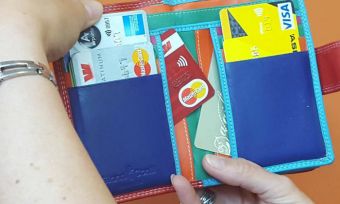Co-author: TJ Ryan
While paying off debt is a huge sense of relief in itself, many people also find they gain gratitude and get rid of unnecessary clutter in their life along the way.
When it comes down to it, there is a huge link between gratitude, living debt-free and minimalism; once you find gratitude you want less and therefore spend less. And, what’s more, paying off debt pushes you to focus on what you actually need and be grateful for that.
As the notable Oprah Winfrey says: “Be thankful for what you have; you’ll end up having more. If you concentrate on what you don’t have, you will never, ever have enough.”
If you’re at the lucky stage of having paid off your debt, congratulations! But after making your final payment on your debt, you’re most probably going to feel exhausted, poor and missing your weekly treats that got you into debt in the first place. This is why every step along the way, you should remind yourself of all the things to be grateful for in life.
How to fill your life with gratitude when life feels sparse

When you’re budgeting and saving, let’s face it, life can often feel a little sparse. You might wonder what there is to be grateful for when you’re eating leftovers and you haven’t bought yourself a cafe coffee in months.
Practicing gratitude can be vital in times like these. According to Berkeley University’s renowned Greater Good Science Center, gratitude has been scientifically proven to:
- Increase positive emotions.
- Reduce the risk of depression.
- Heighten relationship satisfaction.
- Increase resilience in the face of stressful life events.
- And there’s more where that came from! Gratitude has never-ending benefits and once you learn to be grateful, it’s almost guaranteed you will be happier in all aspects in your life.
Your friends and family will thank you for practicing gratitude. A research team at Brigham Young University found that materialism leads to an unhappier marriage than marriages that instead practice gratitude.
How being grateful will help you get rid of your debt

Here are four ways gratitude can help us to get rid of our debt –
- Get rid of everything you don’t need. Others will be grateful for something you don’t even use, and you will see that actually you do have everything that you need. When you have less stuff, you might even be able to live in a smaller, less expensive home. Donate the clothes you don’t wear to an op shop, and give away that extra desk – just taking up space – to a refugee centre near you.
- To overcome your reluctance to part with an item – or your debt – think of how grateful you will be when it is gone. Getting rid of items we don’t like or use anymore shines the spotlight on the items we own and love, meaning we are grateful for all of our items. Once we are grateful for our belongings, we no longer want to keep on buying and therefore save money which can go towards paying off our debt. And eventually our savings account.
3. Plenty of Kiwis are spending more than they need to on personal loan and credit card interest rates. We – at Canstar – compare credit card interest rates from as little as 12.69%, with a six-month introductory rate of only 2.99%. Compare below to see if you’re paying too much interest on your loans so you can pay off your debt faster and build up that savings account instead.
Compare credit cards with Canstar
It’s best to also compare savings accounts on the market to make sure you’re getting as high an interest as possible for your hard-earned money.
Compare savings accounts with Canstar
4. When we are using what we do have (and are grateful that we have even that much), we’ll be too busy to miss what we gave up. If we complain about what we don’t have or what we “need”, we’re wasting a beautiful moment that could otherwise be spent being grateful. Having what we actually need on show distinguishes the differences between what we need and want, pushing us to buy only what we need. Once we can visualise what we need, we can also sell the items we don’t need which your debt repayments will lap up. Gratitude stops us from impulse spending. The less you go to the shops, the more you have a more positive state of mind because you’re not looking for more things to make you feel happy. This also prevents buyer’s remorse!
How you can practice being more grateful

Here are five ways to practice gratitude every day, suggested by Forbes:
- Write in a gratitude journal – Writing down the daily things to be grateful for has a multitude of benefits. Finding happiness in the mundane, the everyday, makes you grateful for the little things so that the larger accomplishments have an even bigger effect. While daily reasons to be happy may usually be passing thoughts, writing them down really makes you focus on them. Research shows gratitude journals lower anxiety, lift energy and mood, promote happiness and alertness. And on top of this, the research reveals gratitude journals help you have a better night’s sleep, relieving the stresses that keeps you up at night. You can write in the journal whenever suits you, whether that be on the bus, before bed, upon waking up or even if you get to work a few minutes early. Simply, write down five things you are grateful for. If you’re of the millennial generation or purely don’t enjoy carrying a bulky journal around, try the gratitude journal app Grateful.
- Be grateful towards others- Gratitude doesn’t just compromise of things, it means to be grateful for beings too, loved ones, acquaintances, family, friends, and even strangers. We often appreciate others on special occasions but implementing it into our daily lives will really make us realise how lucky we are and make your loved ones appreciate you too. They don’t have to be costly acts and can even be as simple as telling others you’re grateful for them, talking to them more often, leaving thank you notes or surprising them with breakfast. Anything goes but you’re sure to reap the benefits.
- Go for gratitude walks- Like a normal walk but practising mindfulness at the same time – win, win. Going for a walk for as little as 15-20 minutes a day, focusing on your breathing, your steps and the environment around you, has been proven to boost happiness. And you don’t have to add this time into your already busy schedule, why not practice gratitude while walking to your bus stop in the morning or on the way to get a bite to eat. Take in the sun’s warmth, or soft breeze, the hustle bustle of the city or the calmness nature blesses us with. Whatever it is, there is always room to be grateful.
- Foster food gratitude- Studies have shown appreciating your food improves digestion, boosts mood and regulates blood sugar levels. Mindful eating involves minimising technology distractions, which in turn, puts the focus on the flavours, textures and aromas your food offers. Another way to delve into food gratitude is to volunteer at a food charity, which will bring to light that food isn’t such a norm for others. 5. Practice mindfulness- To practice gratitude we must live in the here and now, and that’s where mindfulness comes to play. Originally rooting from the Buddhist way of living, mindfulness encourages you to focus on the present rather than the future or past. This includes everyday living, surroundings, relationships and more. Again, like the gratitude journals this step makes you appreciate the little things.
TJ’s personal “bonus tip”:
Find friends who focus on gratitude and people, not the things they have and the things they want. They say you become similar to the five people you surround yourself with the most, so take a step back and evaluate whether you’re happy with your current mindset and those contributing to it.
One more way to declutter your debt
A 2018 National Bureau of Economic Research study has found people tend to “balance-match” when paying off debt; repayments are shared equally between cards, regardless of interest rates. For example, if $15, 000 was owed on one card and $10, 000 was owed on the other, they may pay $1500 on the first card and $1000 on the second, even if the interest rate on the first was higher. This means in the long run, the amount of interest paid would be higher. But in reality, the best strategy is actually to work towards repaying the debt that has the higher interest rate.
In order to accomplish this, you may need to de-clutter your debt by putting it all in one place, with a lower interest rate. A balance transfer can be a good way to do this if you can manage to repay the debt by the time the nice, low introductory interest rate period finishes.
Compare credit card interest rates
Want more finance tips?

Sign up for free to receive more news and guides, straight to your inbox.
By subscribing you agree to the Canstar Privacy Policy.




Share this article